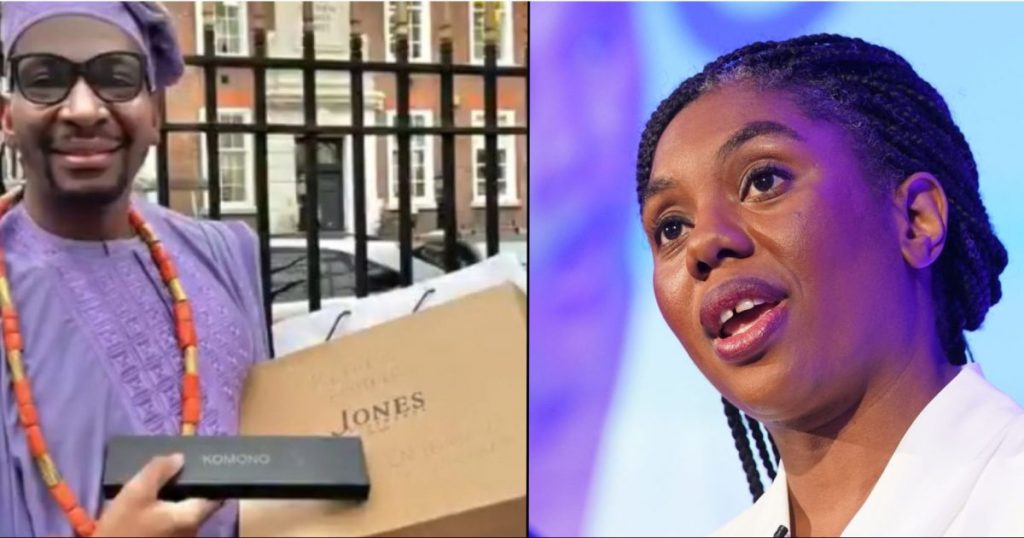Kemi Badenoch, a prominent figure in British politics and the leader of the UK’s Conservative Party, ignited a controversy with remarks made during a December 2024 interview. Recounting her experiences with law enforcement in both Nigeria and the United Kingdom, Badenoch highlighted a stark contrast. While praising her positive interactions with British police, she criticized the Nigerian Police Force (NPF), alleging that officers had stolen her brother’s shoes and watch during an encounter in Nigeria. This accusation, framed within a broader critique of Nigeria as a “very poor country” where people “do all sorts of things,” sparked a wave of reactions, ranging from support for her perspective to condemnation for what some perceived as an unfair and damaging portrayal of her homeland.
The incident gained further traction when James Akinwande, a Nigerian man residing in the UK and the international manager of renowned Nigerian comedian Kenny Blaq, responded to Badenoch’s claims. Taking exception to her characterization of the NPF, Akinwande decided to make a symbolic gesture. He documented himself purchasing a new pair of shoes and a wristwatch in a UK store, items intended to replace those allegedly stolen from Badenoch’s brother. He then traveled to the Conservative Party headquarters, where he entrusted the gifts to security personnel with instructions to deliver them to Badenoch. Akinwande accompanied his action with a message underscoring his intention: a gesture of goodwill on behalf of Nigerians who felt hurt by Badenoch’s remarks, an attempt to “buy back” the stolen items, and a subtle challenge to the narrative she presented.
Akinwande’s video, capturing his symbolic act of replacing the purportedly stolen items, quickly spread across social media platforms, attracting widespread attention and sparking further debate on the issue. The video’s virality amplified the already sensitive discussion surrounding Badenoch’s comments, bringing the incident to a larger audience and fueling the ongoing conversation about police conduct, perceptions of Nigeria, and the role of public figures in shaping those perceptions. However, despite the video’s rapid spread and impact, the original post was subsequently removed from Akinwande’s social media account, leaving the reasons behind its deletion open to speculation.
The controversy surrounding Badenoch’s remarks and Akinwande’s response unfolded against a backdrop of complex and sensitive issues, including concerns about police accountability, corruption, and the challenges faced by developing nations. Badenoch’s comments touched upon themes of poverty and its potential link to unethical behavior, while her critics argued that her statements painted an overly simplistic and negative picture of Nigeria. This incident also highlights the power and potential pitfalls of public pronouncements, particularly when made by individuals with significant influence. Badenoch’s position as a prominent political figure amplified the impact of her words, while Akinwande’s response demonstrated the potential for individuals to leverage social media to challenge established narratives and engage in public discourse.
The broader implications of this incident extend beyond the immediate exchange between Badenoch and Akinwande. It raises questions about how individuals from diasporic communities navigate their relationship with their countries of origin, particularly when those countries face criticisms on the international stage. It also underscores the sensitivities surrounding discussions of corruption and the challenges of holding institutions accountable in contexts where such issues are prevalent. Furthermore, this incident serves as a reminder of the speed and reach of information dissemination in the digital age, and the potential for social media platforms to amplify both positive and negative messages, shaping public opinion and influencing political discourse.
The exchange between Badenoch and Akinwande, though sparked by a specific allegation, ultimately touched on wider societal issues. It highlighted the complexities of cross-cultural understanding, the potential for misinterpretations and generalizations, and the importance of nuanced and respectful dialogue when addressing sensitive topics. The incident also serves as a case study in the dynamics of online engagement and the role of social media in amplifying individual voices and shaping public conversations on matters of local and international concern. The removal of Akinwande’s original video adds another layer of complexity, leaving room for speculation about the motivations behind its deletion and further underscoring the ephemeral nature of online content and the challenges of preserving a complete record of digital exchanges.


